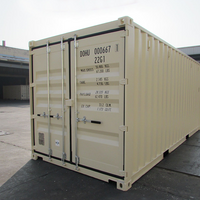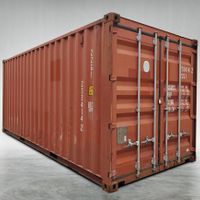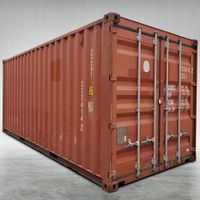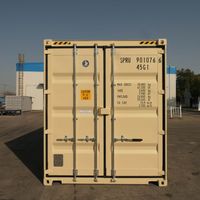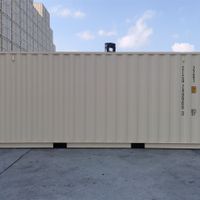Buy shipping containers in all sizes and conditions at competitive wholesale rates in St. Louis, Missouri. Ideal for shipping, storage, or custom modifications, our containers come directly from trusted suppliers with no commission charges.
Explore unbeatable deals on our container trading marketplace.

Trusted by 1500+ Container Providers, Traders, Freight Forwarders, and NVOCCs
Buy a new or used shipping container for sale in St. Louis, MO
Find quality containers at wholesale prices. Use the search tool to browse through a selection of new and used containers for sale in St. Louis, MO.
99 results found on the platform.
Container prices start from $900/unit.
Currently no match for your search
Change your search criteria or fill out the form below to get notified via email when there is a new match for you on xChange!
-
Pick-up

20DC (Brand new)
1 unit available
YOM:
Year of manufacture:
2024
2025
Saint Louis, MO
per container
Negotiable price$
2250
-
Pick-up

20DC (Cargo worthy)
2 units available
YOM:
Year of manufacture:
2005
2013
Saint Louis, MO
per container
Negotiable price$
1250
-
Pick-up

20DC (Cargo worthy)
10 units available
YOM:
Year of manufacture:
2005
2013
Saint Louis, MO
per container
Negotiable price$
1250
-
Pick-up

20DC (Brand new)
2 units available
YOM:
Year of manufacture:
2023
2024
Saint Louis, MO
per container
Negotiable price$
2450
-
Pick-up

20DC (Brand new)
1 unit available
YOM:
Year of manufacture:
2024
2025
Saint Louis, MO
per container
Negotiable price$
2050
Showing 5 of 99 results
Load more()
YOM:
Year of manufacture:
per container
$
Price Trends: How much do shipping containers cost in St. Louis, Missouri?
- A cargo-worthy 20ft container in St. Louis, MO generally ranges from $1,700 to $1,900. However, on our container marketplace, you can negotiate and secure one for under $1,600, offering you substantial savings.
- A cargo-worthy 40ft container in St. Louis, MO typically costs between $2,000 and $2,300. However, on our marketplace, you can secure one for as low as $1,800.
- In St. Louis, the highly sought-after 40ft HC cargo-worthy container usually costs between $2,200 and $2,600 in the market. However, on our marketplace, you can secure one for as low as $2,000—offering significant savings compared to typical market prices!
Live container availability in St. Louis on xChange
With more than 2,000 available containers for sale in St. Louis, we offer the ideal unit to suit your needs—whether you’re looking for long-term storage, equipment housing, renovation projects, or even constructing container homes.
Explore container options in other cities beyond St. Louis, MO
Looking to expand beyond St. Louis? We connect you with verified suppliers nationwide. Below are the average shipping container prices in key cities like Kansas City, Memphis and Chicago.
Shipping containers for sale in other cities
How St. Louis businesses gain from the xChange marketplace
Transportation and Logistics Companies
St. Louis has long been a critical logistics hub, thanks to its strategic position on the Mississippi River and its role as a major gateway to the Midwest. With access to key inland waterways, rail networks, and highways like I-70 and I-64, St. Louis provides unmatched intermodal transport options for shipping companies.
Our container marketplace helps logistics businesses in St. Louis by connecting them with over 1,700 global suppliers. Whether transporting goods via rail, road, or river, companies can access real-time inventory and commission-free container worry-free.
Container Trading and Rental Companies
St. Louis’ manufacturing sector, ranging from automotive to food production, depends on containers for storage and the transport of goods. Container trading and rental companies play an essential role in meeting these industry needs while also serving logistics and construction sectors.
Our marketplace enables container traders and rental companies in St. Louis to purchase containers directly from global suppliers, helping them build and maintain their inventory. With real-time market data, companies can buy containers when prices are low and sell at competitive rates.
Modification and Construction Industry
St. Louis is seeing increased interest in modular construction, especially for eco-friendly, fast-deployment projects in areas like The Grove and Lafayette Square. Shipping containers are being used for innovative housing, retail, and office projects.
Our marketplace provides modification and construction companies with high-quality containers at wholesale prices. With our commission-free platform, businesses can source containers affordably, allowing them to reduce building costs
Storage and Self-Storage Companies
As St. Louis experiences urban growth in areas like Central West End and Soulard, the demand for self-storage solutions has risen, both for businesses and residents. Companies need cost-effective storage options to meet fluctuating demand.
Our platform offers access to competitively priced shipping containers that can be repurposed for portable or self-storage solutions. With containers available for purchase, storage businesses in St. Louis can expand their offerings efficiently.
How our container trading marketplace works
1
Get Started with Container xChange
Schedule a call with our experts to receive a free demo of our container trading marketplace and set up your account.
2
Browse and compare container offers on our marketplace
Submit your container requirements and receive a list of matching container offers in one dashboard. View upfront prices, supplier reviews, pictures and essential container details, including year of manufacture (YOM), forklift compatibility, CSC certificate, and much more. Compare the offers and contact the supplier directly through the platform.
3
Negotiate directly with the supplier to get the best prices
Use our chat feature to directly contact the supplier and negotiate prices and terms. For informed negotiations, access real-time and historical container prices to secure the best container deal at 0% commission.
4
Buy containers brokerage-free and have 7-day money back guarantee
APay for the container units using our secure Payment Handling feature. This feature grants buyers a 7-day protection window to inspect and accept purchased containers. Funds are transferred to the seller seven days later, ensuring you only pay for genuine deals.
xChange Marketplace demo
You are just a few steps away from making the best container buying decisions for your business.
What Customers say about xChange

What
clients say:

Average Rating 4.8/5 based on 650 reviews. Rating data sourced from Featuredcustomers.com
Case Study: Grunsky Trading Co
James Grunsky, with decades of experience in real estate and trucking, expanded into global container trading with Grunsky Trading Co. Within a year of buying and selling containers on the platform, Grunsky achieved impressive profit margins. Read the full story here
95%
Business done via platform
54
New partners found
600+
Containers traded worldwide
“xChange has been a massive help in helping me find containers all over the world. The payment infrastructure and tracking systems that are incredibly helpful.”
– James Grunsky, CEO, Grunsky Trading
Frequently Asked Questions (FAQs)
What industries in St Louis commonly use 40ft and high-cube containers?
In St Louis, several industries commonly use 40ft and high-cube containers, especially for their large-volume storage and transport needs. The city’s proximity to major transportation hubs like the Port of St Louis and highways (I-70, I-44, I-55) supports efficient container movement.
Industries that frequently use these containers include:
- Manufacturing: For transporting machinery, automotive parts, and raw materials.
- Agriculture: Missouri’s grain and soybean exporters rely on larger containers for bulk shipments.
- Logistics: Firms use these containers to connect goods between the port and national destinations.
- Construction: For storing and moving large equipment and building materials.
- Retail/wholesale trade: Businesses handling bulk inventory like furniture and electronics.
These industries rely on the additional capacity and height of 40ft and high-cube containers to streamline their operations.
Are there specific container handling fees or port charges at the Port of St Louis that businesses should be aware of?
Yes, there are specific container handling fees and port charges at the Port of St Louis that you should be aware of:
- Handling Fees: Charges for loading/unloading containers, varying by size (e.g., 20ft or 40ft containers) and type (e.g., refrigerated).
- Dockage Fees: Fees are based on how long vessels dock at the port.
- Storage Fees: If containers exceed the free storage period, businesses will face demurrage or detention charges.
- Drayage Fees: Fees for moving containers within the port or to nearby locations, often depending on transport mode.
- Customs Fees: Additional costs for inspections or customs holds.
For more information on port fees and specific charges, visit the official website of the Port of St Louis.
What factors should businesses in St Louis consider when choosing a shipping container size?
Businesses in St Louis should consider the following factors when choosing a container size:
- Cargo volume: For smaller loads, a 20ft container may suffice, but a 40ft or high-cube container is more cost-effective for larger shipments.
- Container condition: Decide which condition (new or cargo-worthy) is apt for your cargo. New containers, also known as one-trip containers, are more durable and require less maintenance, but used containers can be more budget-friendly and usually quite durable too.
- Budget: Different container sizes come with varying costs. Businesses must understand and be clear about their budget and their shipping needs. Sometimes, larger containers like the 40ft can be more cost-effective than two 20fts due to their prevalence.
- Storage space: Ensure the container size fits your available storage areas or warehouse capacity.
By considering these factors, businesses in St Louis can select the most efficient shipping container size for their logistical and storage needs.
How can I find the most cost-effective shipping container sizes around St Louis?
You can find the most cost-effective shipping container sizes in St Louis using the Container xChange marketplace. Our platform helps you compare prices and availability for different container sizes in your area in the most efficient manner.
Here’s how to get started:
- Search by size and location: Look for popular options like 20ft and 40ft containers, which are generally the most affordable due to their wide availability.
- Compare pricing trends: Container xChange provides real-time data, so you can track local price fluctuations and secure the best deal when demand is lower.
- Consider your specific needs: If you need more space, high cube containers, which offer extra height, can still be a cost-effective option.
- Leverage St Louis’ logistics: With easy access to major highways like I-70 and I-55, along with railways and the Mississippi River port, you can reduce transportation costs, further increasing savings.
By regularly monitoring prices on Container xChange, you can ensure you’re getting the most value for your money in the St Louis area.
How does the Port of St Louis’ access to the Mississippi River impact container shipping costs?
The Port of St Louis’ access to the Mississippi River offers significant cost-saving advantages for businesses using shipping containers:
- Cheaper inland waterway transport: When using the Mississippi River, the port enables cost-effective shipping of large volumes of goods via barges, which is cheaper than trucking or rail transport. Barges can carry more containers at a lower cost per ton-mile, reducing overall shipping expenses, especially for bulk goods like agriculture and raw materials.
- Reduced overland transportation costs: St Louis’ location along the river allows businesses to minimize the need for longer overland transport routes, such as by truck or train, which tend to be more expensive. Containers can move more efficiently between the port and intermodal hubs, cutting down on fuel and labor costs.
- Access to Gulf Ports: The Mississippi River provides direct access to the Gulf of Mexico, making it easier and cheaper for businesses in St Louis to connect with international shipping routes. This reduces costs for businesses exporting or importing goods to and from global markets.
By leveraging the river’s strategic position, businesses can significantly lower their overall container shipping costs.
When is the best time to buy 20ft or 40ft containers in St Louis?
The best time to buy 20ft or 40ft containers in St Louis is during off-peak seasons when global demand for containers is lower. Key calendar events to consider include:
- Post-Chinese New Year (March to April): After factories in China shut down for Lunar New Year, container flows stabilize, and a temporary surplus often reduces container prices.
- Late Spring and early Summer (May to June): Before the summer construction and retail rush, container demand typically drops, making this a favorable time to buy.
- Post-harvest season (late fall): In agriculture-heavy areas like Missouri, demand for containers spikes during harvest (August to November). After the season ends, prices often fall due to reduced container needs.
Avoid buying during late summer and fall (July to November), as this is when demand for containers surges due to the retail season and agricultural exports. Additionally, major holidays like Black Friday, Christmas, and Golden Week (October) also drive up container prices.
When should I choose a specialized container over a standard one in Missouri?
Choosing a specialized container over a standard one in Missouri depends on your business needs and cargo type. While standard 20ft and 40ft containers suit general use, specialized containers may be necessary for specific industries. Here’s when buying a specialized container is a smart investment:
- Refrigerated (reefer) containers: Ideal for businesses transporting perishable goods, such as food or pharmaceuticals. With St Louis being a hub for agriculture and food distribution, reefer containers are commonly used for cold chain logistics.
- Open-top containers: If you’re handling oversized equipment or construction materials, open-top containers offer flexibility for easy loading, particularly useful for industries in manufacturing and construction.
- Flat rack containers: Perfect for transporting heavy machinery or vehicles. Given Missouri’s strong industrial base, flat racks are a great option for businesses moving large equipment.
- Tank containers: Best for companies handling bulk liquids, chemicals, or fuel. Missouri’s central location makes tank containers essential for transporting liquids across the region.
By investing in the right specialized container, you ensure safe, efficient handling of your goods while leveraging St Louis’s robust logistics network.
How do 20ft and 40ft containers differ in terms of space efficiency in St Louis?
A 20ft container offers approximately 33 cubic meters (1,172 cubic feet) of internal volume, while a 40ft container nearly doubles that with about 67 cubic meters (2,385 cubic feet). The choice between them depends on the volume of goods you need to store or transport.
For comparison:
- A 20ft container can hold up to 50-60 refrigerators or 200 full-sized mattresses. It’s ideal for smaller cargo like household items, machinery, or small shipments.
- A 40ft container can accommodate up to 100 refrigerators or 400 mattresses, making it more efficient for larger volumes or bulky cargo.
In terms of space efficiency:
- The 40ft container is more efficient for larger shipments, helping reduce transportation costs by maximizing cargo per trip.
- The 20ft container is more practical for smaller shipments or for businesses with limited storage space, which may be relevant in urban areas like St Louis.
Choosing the right container size depends on your specific cargo needs and available storage space.
Is buying a shipping container more practical than renting in St Louis, MO?
Both buying and renting have benefits depending on your business needs.
Buying is best for long-term use:
- Cost-effective: Cheaper in the long run if you need containers for consistent use.
- Always available: Useful for businesses with regular shipping via St Louis’ logistics hubs (port, railways, highways).
- Customization: Easier to modify for specific purposes.
Renting is best for short-term or seasonal needs:
- Flexible: Ideal for temporary projects like construction or agriculture during harvest season.
- No maintenance: Avoid repairs from St Louis’ extreme weather conditions.
- Lower upfront cost: No large initial investment, perfect for short-term needs.
The Container xChange marketplace offers both rental and purchase options, giving you the freedom to choose based on your needs. The marketplace provides a wide range of containers, helping you make the right decision for short-term flexibility or long-term investment. For more information on buying vs. leasing, head to our blog on how to buy a shipping container.
Is it worth paying extra for a new shipping container in Missouri?
Yes, paying extra for a new shipping container in Missouri can be worth it, depending on your business needs. New containers provide several advantages:
- Pristine condition: New containers are free from rust, dents, and structural wear and tear, making them ideal for transporting sensitive or high-value goods, like medical supplies or food products.
- Longer lifespan: In Missouri’s varying climate, new containers are better equipped to handle extreme weather, ensuring a longer lifespan and reducing long-term maintenance costs.
- Customization potential: If you plan to modify the container for specific uses (like adding insulation or electrical systems), a new container offers a better foundation for durable customizations.
- Regulatory compliance: New containers meet the latest ISO standards and are less likely to encounter issues with global shipping regulations, saving time and avoiding delays.
However, if your business can manage with minor cosmetic imperfections or prior use, a used container may offer a more cost-effective option. Ultimately, the decision should be based on your specific operational requirements and budget.
Get started
Let us show you how 1,700+ members (from small businesses to enterprise) are seeing value with xChange.










